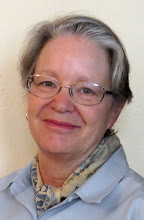Life with Earphones
Did I mention that I bought an MP3 player last month, to further explore modern life? Not only that, but I succeeded in downloading some music I hadn't listened to in a long time because (blush) I only had it on records. Now I have these albums in my computer. I also have copied in my entire (modest) collection of CD's, and downloaded a bunch of sermons and radio shows. Then I coied all that (all that!) to my MP3 player, which weighs about 6 ounces and is a little bigger than a bic lighter. The whole ensemble is quite a bit easier to manage than a Walkman and I can see that this is a technology that is here to stay. There are a few things my MP3 player will not do, and my son has encouraged me to upgrade and let me know that he'd be glad to soothe my "waste not want not" conscience by putting the old one to good use. (He can use it to transfer his massive graphics files from home to school.) Birthday season is comming up, so we'll see. In the meantime, I've been doing my daily rounds and exercising to the company of good music and fascinating words, and feeling, if I do say so myself, downright hip.
I have been one who has deplored the youth culture of walking around with earphones in and ipods on all the time, but I have made some interesting discoveries as I walk the world with earbuds in my ears.
- Walking Albuquerque's busy, noisy, right-on-the-curb sidewalks is much nicer with earphones. I was aware of how much I didn't like walking busy streets like Wyoming and Montgomery...I hadn't realized that it was because of the noise. Listening to my music rather than to the roar of traffic makes the walking experience much nicer.
- I can hear people who are talking to me perfectly well even with earphones in and music on. What I can't do is concentrate on what is being said to me. But I'm just an old lady. The younger generation probably can.
- It turns out to be true that it is easy to let the volume creep up and do damage to your ears, especially with earbud type earphones. I'm living with tender ears the last couple of days, and am going to buy the earpad type of earphones next time.
- Listening to music while doing errands and indoor exercising is a great enhancement of life, and so is walking to music adjusted to the right pace. If I do my whole neighborhood walk to music, I miss the sounds of the city; the birds, the children, the splashing water of backyard pools and fountains.
You may think that all this technoexploration has gone to my head and I'm hopelessly hooked on being hooked to gadets, that I've turned into a computer potato and a blogger head, so let me assure you that, while there is some truth to the computer potato accusation, I have retained my ability to discriminate between what gadgets are really useful and which ones are for show or actively detractive in one's life. Contrarian that I am, I still put the cell phone in the later category, and I don't have one.
[MP3, technology]




